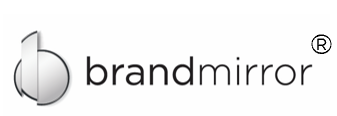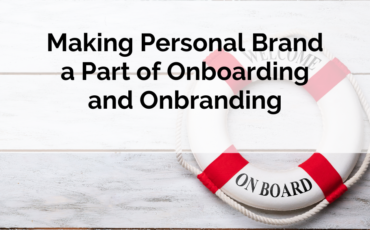The Great Resignation may be a phenomenon, but the monthly jobs reports show that hiring is happening at a brisk pace as well. Many of these new hires are looking for a better opportunity and a good match for their personal values. Good onboarding is the key to employee retention in the job-hopping world we live in, but this process needs to be about more than basic policies and job training. Welcoming a new team member also means integrating their personal brand into the team, the culture, and the larger organization. Here are some critical steps to take.
1. 360° View of the Company Brand
If your new team member accepted the position, they likely have formed an opinion about the company. This is a great starting point in a conversation about the company brand. Try asking them what they perceive and then reorienting them from an outsider to an insider with information about the organizational brand strategy. Rather than stick to how they have interfaced with the brand — as an applicant and a new hire — broaden the discussion to talk about the whole brand experience in terms of culture, partners, customers, and the public. For employees who are new to the concept of branding, this introduction can also help them start thinking about their own brand.
2. Relationship Between Personal and Company Brand
For a team member to become a brand ambassador for the company, they need to understand how their brand is both part and apart from the company brand. This is more than a conversation about work-life balance, and it should apply to every team, not just sales. New hires need guidance on culture, experience, the overall business strategy, and how they connect to the bigger picture. Orientation should help them situate themselves within the company.
3. Transparency About Value to the Team
The successful interview process usually ends in a job offer, but it doesn’t often provide a debrief on the decision-making process that led to the offer. An important, often overlooked aspect of onboarding is to help the employee go behind the curtain and understand their appeal to the company. This is an excellent springboard to success since it tells them how they appear and what value they convey. It provides clarity on the skills and traits that will let them thrive in their new position.
4. What Does Personal Branding Look Like?
It’s never too soon to start mentoring a new team member. Leaders can use themselves as an example in an onboarding conversation with a new hire. Whether it’s a direct report or someone on a completely different team, leaders can share their understanding of personal brand to offer a model of how new hires can think of themselves. One way to do this would be a structured interview with specific, guided questions where the new hire gets a chance to meet and learn about the company’s leadership firsthand. The leader can share their personal brand journey, tips and tricks, and illumination about their expectations for employees of the organization.
5. Company Policies and Practices Around Personal Brand
Being mindful about who you are and how you appear in the world is the essence of a personal brand. New hires to a company should be made aware of the organization’s expectations about their brand. From explaining company culture to describing social media restrictions, it’s essential to give new hires a clear path to success. Some of the subtleties of these issues may not be apparent at first glance and this can lead to misunderstandings or conflict down the road. Some issues like taking video in the workplace are matters of policy, whereas others, like the general approach to dress style, might be less directive and more of a suggestion. Having these conversations upfront, before mistakes get made, will keep the employee aligned with the company and primed for success.
When a person joins the team, clear expectations should include guidance on personal brand. Allowing the employee to build on their strengths can lead to smoother integration and long-term success.
Jen Dalton is a personal brand specialist with entrepreneurship in her DNA. Her book, Listen: How To Embrace the Difficult Conversations Life Throws at You, is an insightful guide into navigating tough talks. She helps business owners and executives define how they show up as leaders, make the most of their strengths, and tend to their legacy, growth, and visibility. The author of two books, frequent speaker, podcaster, and “Purpose Sherpa,” Jen is a critical resource for any person or company that wants to define their brand and differentiate themselves in authentic, credible, and relevant ways to the market. Brandmirror.com

